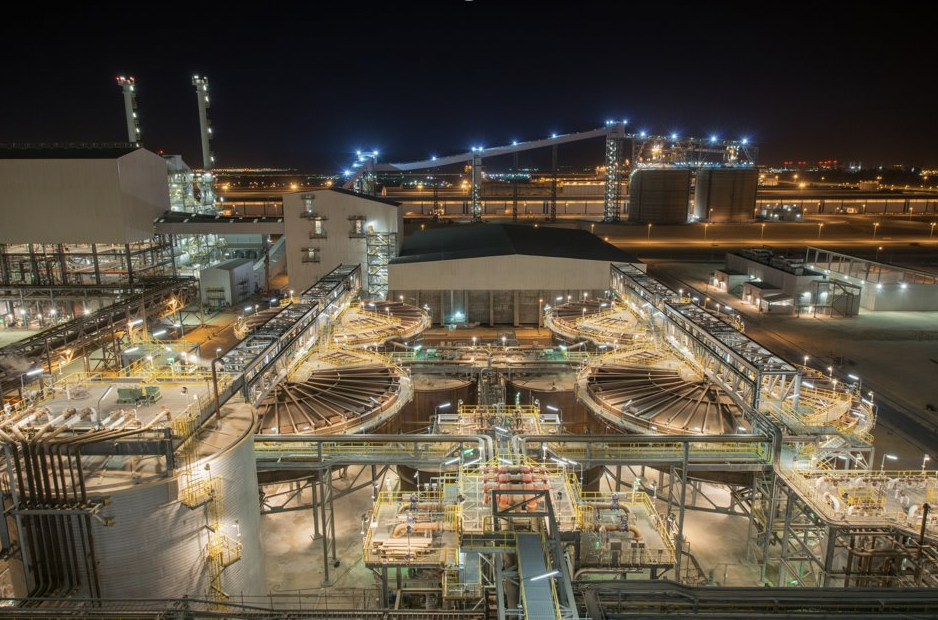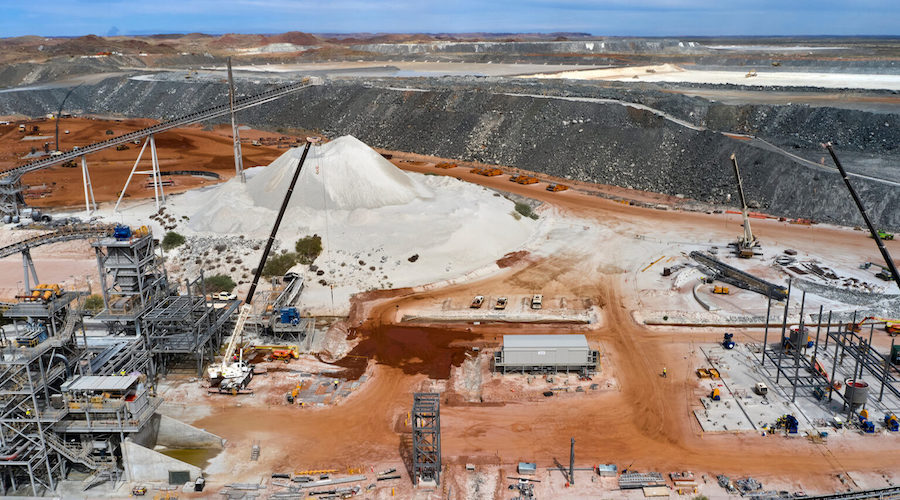Arab Gulf States double down mining efforts

Mining and mineral processing has been gaining momentum for Arab Gulf states as a means of diversifying natural resources beyond oil and gas. Capital & diplomatic efforts have taken strides and shed light upon on the region as active participants locally and serious partners in the global mining sector.
This article consolidates recent developments across the Arab states of Bahrain, Qatar, Oman, Saudi Arabia & the United Arab Emirates (UAE).
Bahrain is in talks with Nornickel to set up Platinum Group Metals (PGM’s) refinery. The news is yet to be confirmed as the potential deal is in the initial stages of discussion. Qatar’s sovereign wealth fund has committed to investing $180 million in TechMet. TechMet is an investment vehicle supported by the US International Development Finance Corporation to help secure responsibly sourced supply of critical minerals and reduce dependency on China.
Oman is experienced and strategically positioned in production and processing capabilities of its copper resources. According to the Ministry of Energy and Minerals’ 2023 Annual Report, six Final Investment Decisions (FID) have been approved for several projects, such as the Mazoon Mining copper ore project in the Wilayat of Yanqul, located in Al Dhahirah Governorate and in Wilayat of Al Khabourah; Al Ghuzayn copper mining project, targeting over six million tonnes of copper ore to be processed at the Wadi Al Jizzi copper concentration plant.
State owned mining company Minerals Development Oman (MDO) alongside their public-private partnerships announced its redevelopment plans at Lasil & Al Baydha Copper Mines in Sohar, Liwa. The project involves several phases: mobilizing and constructing mines, conducting open-pit mining followed by starting processing operations. Copper ore production from the Lasil mine is set to begin this year, with the Al Baydha mine expected to start in 2026. The project aims to produce around 800,000 tons of copper ore annually. The initial phase of the project is to last four years, but ongoing exploration efforts may extend the production period by finding new reserves.
Australia-based mineral exploration and mining company Alara Resources started copper concentrate production from the mine, operated by Al Hadeetha Resources (AHRL), a joint venture company 51% owned by Alara that has a capacity of one million tonnes per year. Alara expects the refinery to reach full production capacity within the next two to three months. The first shipment, consisting of approximately 1,000 dry tonnes of copper concentrate, will be delivered to Trafigura.
Trafigura will offtake all copper concentrate from the mine for period of eight years from the start of production. In return, it provided a $3.45 million financing facility to Alara to use funds to capitalize AHRL and to complete construction of project infrastructure. Repayment of financing period starts from end of September 2025 until end of its maturity, June 2029. Oman’s establishment for the copper mining value chain has paved the way for exploration of other geological resources. This year, Oman signed five mining pacts to extract potash and nickel ores.
Saudi Arabia’s mining boom catapulted after the revision of its legal regime. By revising its mining law, the Kingdom facilitated an investment friendly jurisdiction promoting active exploration. A Saudi Arabian joint-venture company owned on a 50-50% basis by Royal Road and MIDU Company Limited has been selected as the winning bidder, as part of a competitive licencing round, for the Al-Miyah copper and gold tender area. The award consists of three exploration licences, located in the Asir Province of the Kingdom of Saudi Arabia, 150 km northwest of the company’s Jabal Sahabiyah exploration licences. Saudi Arabia interests expand beyond exploration and extraction.
Eyes on the midstream sector
As part of the vision to self-sufficiency and diversification Saudi Arabia is also directing its capital towards a midstream processing sector. According to Saudi Arabia Industry and Mineral Resources Minister Bandar bin al-Khorayef, the government is currently implementing a steel plate factory with a more than $4 billion investment in a steel plate mill complex for the shipbuilding, petroleum, construction and defence industries; and a “green-renewable” flat steel complex that will supply the automotive, food packaging, machinery and equipment, and other industrial sectors. Both projects are already underway, and so is a $2 billion EV battery metals plant.
Saudi Arabia has gone as far as going downstream in the value chain. In March 2022, Lucid motors announced a $30 million lease agreement with developer Emaar Economic City for a plot of industrial land in the King Abdullah Economic City, near Jeddah. The company that is 61% owned by Saudi Arabia’s Public Investment Fund (PIF) said that it aims to complete the Saudi factory by 2025 or 2026 and build up capacity to 150,000 electric vehicles per year. Saudi Arabia has also signed a $5.6 billion deal with a Human Horizons to manufacture electric vehicles as the kingdom is looking to lead the Arab world in expanding economic ties with Beijing. This massive agreement will make Saudi one of the global hubs in electrical vehicles manufacturing and allows China to bypass European taxes on its electric cars.
Local Saudi investor Ajlan & Bros, with United Kingdom-based Moxico Resources, plans to invest $14 billion in developing mines and processing facilities by 2030. Ma’aden mining company also acquired a 9.9% stake in Ivanhoe Electric and established a joint venture to explore for copper, gold, silver, and other metals in Saudi Arabia. Luxembourg-based Eurasian Resources Group has announced its intention to invest $50 million in the Saudi market for large-scale, tech-enabled early-stage exploration for battery transition minerals. Apart from local initiatives, Saudi Arabia mineral partnerships extend internationally.
In July last year, Saudi Arabia’s mining firm Ma’aden acquired a 10% stake in Brazil’s base metals company Vale, through Manara, its joint venture with the PIF. Manara’s investment in Vale will help it expand extraction of copper and nickel. United States-based fertilizer producer Mosaic Co., said that Ma’aden would acquire company’s stake in a phosphate production joint venture by issuing shares worth about $1.5 billion. Ma’aden will issue about 111 million shares to buy the 25% stake that Mosaic owns in Ma’aden Wa’ad Al Shamal Phosphate Co, a joint venture between Mosaic, Ma’aden and Saudi Basic Industries. Saudi Arabia is also investing heavily in its port infrastructure, aiming to position itself as a central hub for the global mining supply chain. The King Abdullah Port and the Jubail Commercial Port are expanding to facilitate the export of minerals and the import of mining equipment, solidifying the Kingdom’s role in the sector.
Domestically this year in the United Arab Emirates, KEZAD Group and UAE-based Titan Lithium have signed a 50-year land lease to build a state-of-the-art lithium processing plant in Abu Dhabi’s Khalifa Industrial Area. With an AED 5 billion (equivalent to $1,361,285,000.00) investment, the plant will produce battery-grade lithium carbonate and lithium hydroxide, sourced from Zimbabwe. This development positions the UAE as a key player in the global lithium market and supports its innovation and sustainable development goals. The project will create jobs, stimulate the local economy, and align with the UAE’s commitment to increasing electric vehicle adoption by 2050.
Mining in the Gulf region has emerged as a key area of opportunity driven by strong diplomatic and financial support through strategic investments
Internationally, the UAE was the first Arab nation to establish foreign deals in the extractive sector, starting with a bauxite mine in Guinea in 2013. This deal included developing an alumina refinery and the Kamsar port. Over the past ten years, the UAE has significantly expanded its mining investments across resource-rich regions, particularly in Latin America and Africa.
United Arab Emirates does this differently than its Arab Gulf counterparts, through buying mining concessions rather than providing investments to others in return for the future supply of raw materials. The majority of Emirati operations in the mining sector are joint ventures. UAE establishes an ecosystem of investment bringing together consortium partners in infrastructure, power, health and logistics. The UAE’s DP World and Abu Dhabi Ports Group are at the forefront of this effort. DP World has secured numerous port concessions across Africa, including in the Democratic Republic of Congo (DRC) and Tanzania. These ports are vital for transporting critical minerals for essential raw materials used in electric vehicles and renewable energy technologies.
It’s worth mentioning that the GCC Mineral Resources Committee has convened four times, focusing on key issues such as: integrating mineral industry chains among GCC countries, mapping regional mineral investments, and protecting geological heritage. The committee reviewed mining strategies from various member states and addressed other agenda items aimed at advancing the mining and mineral resources sector across the Gulf Cooperation Council region. The significance of the latter meeting is that the mining sector is now a serious regional discussion among Arab Gulf States indicating interest and forward thinking beyond hydrocarbon resources.
Mining in the Gulf region has emerged as a key area of opportunity driven by strong diplomatic and financial support through strategic investments, infrastructure development, and partnerships. The Arab Gulf states, particularly Saudi Arabia and the UAE, are intensifying their focus on the mining sector to secure their economic futures. Both the UAE and Saudi Arabia are influencing global resource management and trade by expanding their domestic and international mining sector value chains, positioning themselves as major players in the global market.
* Jamil Hijazi is a mineral economist and reporter who holds a Dual Master’s Degree from the University of Dundee Centre for Energy, Petroleum, Mineral Law, and Policy (CEPMLP).
{{ commodity.name }}
{{ post.title }}
{{ post.date }}




Comments